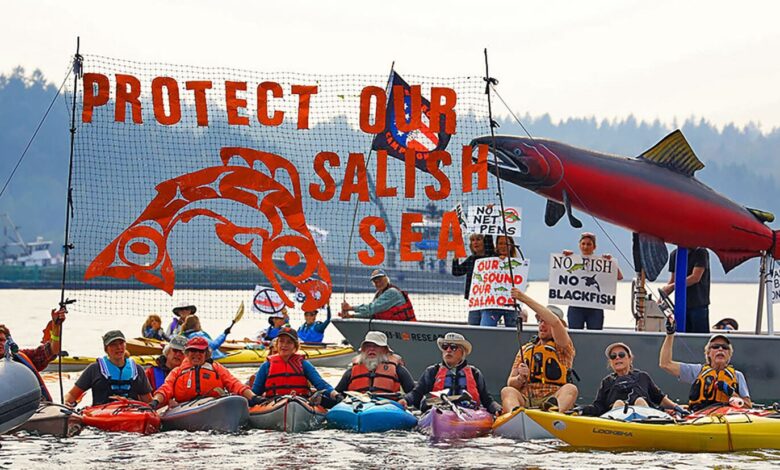
Olympia, WA — Washington state is on the brink of setting a global precedent as the first government to successfully remove and permanently ban commercial net-pen aquaculture from its waters. The decision, hailed by environmentalists and Indigenous communities, underscores growing concerns over the ecological and cultural impacts of industrial fish farming.
The Washington Department of Natural Resources (DNR), under the leadership of Commissioner Hilary Franz, spearheaded the effort to phase out commercial net-pen leases in state-managed waters. In 2022, the DNR declined to renew leases held by Cooke Aquaculture, one of the largest operators in the region, marking a critical step toward the ban. The state legislature is now preparing to formalize the prohibition with legislation expected in early 2024.
Environmental and Cultural Concerns
Net-pen aquaculture has long been criticized for its negative environmental impacts. Open-water fish farms often release untreated waste, chemicals, and antibiotics into marine ecosystems. They also pose a significant threat to native fish populations through the spread of diseases, parasites, and genetic contamination from escaped farmed fish.
Puget Sound and the broader Salish Sea, home to some of the most iconic marine ecosystems in the Pacific Northwest, have been particularly vulnerable. The region’s Indigenous tribes, including the Lummi Nation and the Suquamish Tribe, have voiced strong opposition to net-pen farming, citing its disruption to traditional fishing practices and sacred cultural connections to wild salmon.
A Turning Point for Aquaculture Policy
Washington’s bold move is expected to have ripple effects across the aquaculture industry, inspiring other governments to reconsider the role of commercial net pens in their waters. Canada and other regions have already begun exploring similar policies, citing Washington’s example as proof of feasibility.
“This is a victory for our waters, our salmon, and our way of life,” Commissioner Franz stated in a press release. “We are showing the world that prioritizing environmental health over short-term profits is not only possible but essential.”
Environmental groups, including Wild Fish Conservancy and the Center for Biological Diversity, have praised the state’s leadership, calling the move a “monumental step” toward safeguarding marine biodiversity.
What’s Next?
While the legislative process is ongoing, the state’s decision to permanently end net-pen aquaculture has already created waves. Industry groups argue that the ban could impact jobs and the supply of farmed fish, a popular alternative to wild-caught seafood. Advocates for sustainable aquaculture counter that land-based, closed-containment systems can address these concerns while eliminating harm to wild ecosystems.
If the legislation passes as expected, Washington will solidify its position as a trailblazer in marine conservation, sending a powerful message to policymakers worldwide. The ban represents a rare intersection of environmental stewardship, Indigenous rights, and sustainable development, offering a blueprint for the future of ocean governance.




